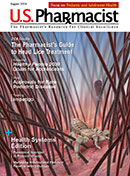Findings from a study published in the Journal of the American Medical Association revealed that there has been a substantial increase in the use of the OTC supplement melatonin, which is marketed for sleep, and some individuals may be taking too much of it. The authors indicated that the most noteworthy increase was in the last decade, and the prevalence of using higher dose melatonin (over 5 mg/day) was greater within that time frame.
In the recent study, researchers indicated that although melatonin is commonly regarded as safe, adverse effects have been reported, and there are limited—if any—data on long-term use and high-dose use of this commonly used supplement. Moreover, the heterogeneity in OTC formulations further strengthens the need for a clearer understanding of the utilization of melatonin supplements among the adult population.
In the study, researchers examined reported prevalence and trends in use of melatonin supplements among U.S. adults from 1999 through 2018. The authors noted that recommended dosage of melatonin typically does not exceed 5 mg/day. They also examined prevalence and trends in use of greater than 5 mg/day of melatonin.
The researchers used data from the 1999-2000 through 2017-2018 cycles of the National Health and Nutrition Examination Survey (NHANES), a series of cross-sectional, stratified, multistage probability sample surveys of the noninstitutionalized U.S. population, with response rates ranging from 51.9% (2017-2018) to 84.0% (2001-2002). Participants younger than age 20 years (n = 46,235) or without available dietary supplement data (n = 58) were excluded. For the evaluation on greater than 5 mg/day of melatonin use, researchers also excluded those reporting melatonin use but without daily dose information (n = 2).
The National Center for Health Statistics Institutional Review Board approved the NHANES protocol, and all participants provided written informed consent. Data on "dietary supplement use during the past 30 days" and "daily dose used when taking the supplements" were collected through an in-home interview, and to aid reporting, participants were required to show supplement containers.
Results revealed that data from 55,021 adults (average age, 47.5 years [standard deviation (SD), 17.1] years; 52.0% women) from 10 NHANES cycles were included. The number of participants included in each cycle ranged from 4,865 to 6,214, and supplement containers were verified by interviewers for 93.9% of self-reported melatonin users.
The overall reported weighted prevalence of melatonin use expanded from 0.4% (95% CI, 0.2%-1.0%) in 1999-2000 to 2.1% (95% CI, 1.5%-2.9%) in 2017-2018 (linear P = .004), with an expansion beginning in 2009-2010 (quadratic P <.001). Trends were comparable across gender and age groups (interaction P >.05 for all). The authors indicated that prior to 2005-2006, melatonin use exceeding 5 mg/day was not reported. The prevalence of melatonin uses greater than 5 mg/day increased from 0.08% (95% CI, 0.02%-0.38%) in 2005-2006 to 0.28% (95% CI, 0.13%-0.60%) in 2017-2018 (P = .005).
The authors revealed that the limitations of the study included its reliance on self-reported melatonin use, although supplement containers were confirmed in nearly all participants, and since there were a small number of melatonin users in some subgroups, results of stratified analyses should be interpreted with caution.
The authors wrote, "Among US adults, reported prevalence of melatonin supplement consumption significantly increased from 1999-2000 to 2017-2018 across all demographic groups. Although it remained very low, prevalence of self-reported use of greater than 5 mg/d of melatonin also augmented over time. These estimates may raise safety concerns, especially given that the actual content of melatonin in marketed supplements may be up to 478% higher than the labeled content and that evidence supporting melatonin use for sleep disturbances is weak."
In an interview on the MedPage Today website, Naima Covassin, PhD, of the Mayo Clinic in Rochester, Minnesota and one of the authors of the study, stated, "Given the increasing popularity in use of exogenous melatonin, our observations support the need for better awareness of safety and effects of melatonin supplements in the public, as well as among medical professionals."
The content contained in this article is for informational purposes only. The content is not intended to be a substitute for professional advice. Reliance on any information provided in this article is solely at your own risk.
« Click here to return to OTC Update.






